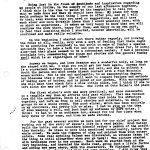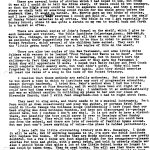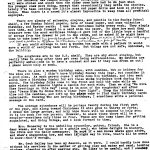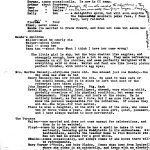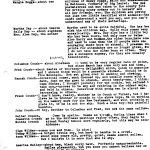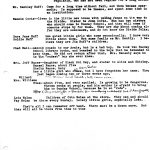Pine Mountain Settlement School
Series 09: Biography
Series 33: Religion
ALICE COBB STORIES Handing Over Divide Sunday School to Miss Cold, June 1937
TAGS: Alice Cobb Stories Handing Over Divide Sunday School to Miss Cold, June 1937; Alice Cobb; Divide, KY; Divide Sunday School; Edith Cold; Pine Mountain Settlement School; Harlan County, KY; Sunday schools; religion; education; church; community; Bible Institute; handwork; songbooks; birthdays; library;
As Alice Cobb prepared to leave her position at Pine Mountain Settlement School, she was clearly reluctant to give up her work at the small church where she had started Sunday school she had started at Divide, a small community adjacent to the School. She wrote a long letter to Edith Cold, another worker at Pine Mountain who had taught Sunday school for many years and had been substituting for staff who had started Sunday schools in some of the local churches. Edith Cold was a teacher at Pine Mountain who had a long experience in working with the community and was highly thought of by the local people. Many knew of her extraordinary life in Turkey working with Armenian families during the Ottoman invasion and massacres before coming to Pine Mountain. Her bravery during this service work was recorded by the New York Times and other news organizations and was extraordinary.
Alice Cobb’s letter was written to introduce Miss Cold to the Divide Sunday School. Her letter and notes provide very personal and sometimes overly intimate opinions on the lives of families living close by the School and who passed through Cobb’s classes. She was never short of opinions and perceptions. Part religion, part social service, this letter to Edith Cold defines the community work that she conducted in addition to her duties at the settlement. She obviously enjoyed her Sunday school work and she demonstrates, for good or ill, her deep religious beliefs, her biases, and her hopes and desires for better lives for her students.
GALLERY: Handing Over Divide Sunday School to Miss Cold, June 21, 1937
- cobb_handing_over_divide_001
- cobb_handing_over_divide_002
- cobb_handing_over_divide_003
- cobb_handing_over_divide_004
- cobb_handing_over_divide_005
- cobb_handing_over_divide_006
TRANSCRIPTION: Handing Over Divide Sunday School to Miss Cold, June 21, 1937
cobb_handing_over_divide_001
Dear Miss Edith [Cold]:
Just In the flush of gratitude and inspiration regarding my people at Divide, In the memory of our last afternoon together, I think this is the time to yield to the temptation to tell you what we have done and what we should have done. My plans for them would perhaps be the best thing I have to offer you, and so I will do that, even knowing that you need no suggestions, and will have much wiser and more workable ideas than I could possibly have, with so short an experience. It makes me very happy to know that you will continue the work there, happy for them, and happy on my own part, to feel that something which I started, however unworthily, will be continued and made really valuable.
In the beginning I started out there rather vaguely, not knowing the folks at all, really, only with a sort of feeling that there ought to be something for everybody in the world to make of Sunday a special set-aside day, to take a bath for and put on a clean dress for, If nothing else — and that place seemed to be a convenient center. I had a personal nostalgia too, remembering the songs and stories and the general Sunday smell which is so significant of home!
Anyway, we began, and Cora Scearce was a wonderful help, as long as she stayed with me. I wish you could get her back again. Anyway, that is a convenient halfway place to stop and call, and she is without a doubt the person who most needs direct contact with a Pine Mountain woman worker. She Is shy and apologetic, to an exasperating degree, but blossoms like a rose. She will want to compare recipes and methods of taking care of babies and is proud of her garden. With encouragement, she will make that shack Into a nice little place, but I think If she is left alone she may not get It done. She lives at Otto Nolan‘s old place.
The first winter’s work was more practical and more successful in a tangible way than my efforts this past winter. That was because Cora did the mechanics, which is the flour that holds the structure together, and left me free to tell stories and entertain, in small groups or a whole crowd. The past winter, which has been entirely on my shoulders, was pretty hit or miss. I had to give up the idea of even keeping a roll, and kept my audience by sheer noise, I think! It had to be an audience too, except for the few times when only three or four came, and then we made strides.
For the past several months we have had for our chief project the working out of the story of Jesus’s life on a sand table. Grub Bailey built the table, and so considers himself rather a patron of the activities therein. He likes to have this mentioned occasionally, before the whole crowd. We made the figures of clay and painted them with watercolors. Some real modeling talent was discovered, as witness Satan (If the thing is still altogether when you go back). The picture started with Bethlehem over in one corner. Each week we started back at the very beginning. and traveled the whole road, going little farther and adding one more story, with its characters. We finished through the Sermon on the Mount, and then had parables. I did think that quite a few Iessons on the stories that Jesus told, and some of the miracles he performed, would be good, but believe that the Old Testament Stories are perhaps the ones that grip them more easily. I used a Jewish book which I cannot find just now, and have probably given to some of the children. It had nice pictures.
cobb_handing_over_divide_002
There several books of stories which I had hoped to use, but found it was all I could do to tell the Bible story. If there could be two teachers, so that the Bible story could be told in separate classes, and then a second story or chalk talk or something could follow for the whole group before the handwork time, it would be better. Mr. [Glyn] Morris gave me two books of stories and I have jealously hoarded everyone I could get hold of. They are in the shelf of Sunday School material in my office. The Bible is one I got especially for Sunday School since it was quite a strain on my own to travel back and forth in a basket so often.
There are several copies of John’s Gospel on the shelf, which I give to each newcomer and visitor. The Bible Institute Colportage Assn., 843-845, N. Walls St., Chicago, is very good to send all that we can use or give away. I am enclosing their suggestions for work to be done in order to secure the Pocket Treasury, which several of the children have earned. They call it
the “little green book”. There are a few copies of this on the shelf.
There are also two copies of the New Testament, and some little white folders with verses to be learned “Four Things God Wants Us to Know”. Some of the verses I think are hardly fit to memorize but It doesn’t hurt the children — in fact, they really enjoy it —- and if they earn the Testament I think they will appreciate it more. I hoped that Emily Bailey and Fred Couch would complete their memory work, but they didn’t quite. They will have forgotten by fall and should begin over again. Also, they should memorize at least one verse of a song in the back of the Pocket Treasury.
I realize that these methods are awfully motheaten. But one hour a week too short a time In which to institute any sort of progressive education, except through handwork. I tried Fahs [Sophie Lyon Fahs] method when I had the little Sunday School here at Pine Mountain, and It would have been all rlght if I could have had them every day and all day. I undertook It so enthusiastically and was so without caution In outlining my plans to her and our class at Riverside Church, that I still feel chagrined — but I had to right about face.
They need to sing more and there needs to be a musical instrument. Perhaps Fern [Fern Hall Hayes] would go down occasionally and play the guitar, or perhaps Estel Elam could do It—he twangs the holiness songs (Incidentally I have found that our best singing was done holiness fashion, and have not discouraged it—perhaps should have, but I confess that I don’t see why) It is not safe to have a victrola there, but possibly the boys could carry it over to Hensley after Sunday School, each week. They would take care of It. I feel sure you could have one from the school, and there are lots of records of familiar hymns around. But one Just can’t leave anything of value—the place is raided periodically.
I have left the little circulating library with Mrs. Hensley. I think it will be safe, but if anything happens to it, I’m sure the Bible Institute will replace the books. Of course, they are Moody choices, and some are pretty doubtful, but a few I think are just exactly right for the youngsters — pleasant stories for boys and girls, with a moral twist and told In utterly simple words. Also, I should think that quite a lot of the Little School books no longer In use could be taken down. They do need books. You will see that there are none to speak of, even on the school shelf. A more accurate check should be kept than my informal one, for I lost a good many. But I couldn’t keep it, and really it’s surprising that more weren’t lost or stolen.
cobb_handing_over_divide_003
[Notation; “Lately,”] The handwork has limped along. The scrapbooks which started out so well were stolen and since then the older ones have had to do just what the younger ones were doing, except that occasionally they write the stories. Lately, I’ve been letting the little ones cut paper dolls and look at picture books. When there is a crowd it’s almost impossible to keep them all profitably employed.
There are plenty of scissors, crayons, and pencils in the Sunday School shelf, a few Sunday School papers, lots of blank paper, and some valentine, birthday, and Easter cards. I use the Christmas cards every week. They simply love them, and look forward to a card with the paper. To show how much they treasure even the most worthless thing — I gave one of the little boys a handful of scraps from the drawer to put in the stove, and he asked if he might have them to take home! [Notation: “Their favorite handwork is to make a frame in a piece of white paper with crayon and paste a picture in the frame. The Christmas card pictures are fine for this, too.”]
If you could arrange to have a wooden box made with a padlock it would save a world of carrying back and forth. But things are not safe, unlocked, in the building.
The songbooks are in the S.S. [Sunday School] shelf. They are shy about singing, but really like to sing after they get over being self-conscious. My methods are perfectly awful — one is to have a contest and see if they can drown me out! A piano would help so much.
There is also a wooden birthday cake with candles, but no holders for the mice ate them. I didn’t have birthday Sunday this year, but consider it a good plan. As each person comes I write down his birthday, and then each month have a Birthday Sunday for all those whose birthdays cond during the month. The birthday folks come to the front and hold the cake while we make wishes and someone lights a candle for each wish. Then we sing “We Give Thee Greetings on this Day” (song is in most of the songbooks) and after that “Jesus Bids Us Shine With a Clear Pure Light“. Then the birthday ones blow out the candles, and lift up the cake to find their birthday cards underneath. Knowing who are having birthdays, I sometimes write a personal message on the card.
The average attendance will be perhaps twenty during the first part of the year, and along toward Christmas it will grow to thirty or forty. I dread the large groups and only hope there will be someone to help you. It is too much for one person. However, in slack times there will be a respite — sometimes only three or four. These are the cozy times for getting acquainted and doing things, and I look forward to them.
Mrs. Henseley is the unfailing counselor, patron, friend. She is a dear woman, and her husband is a gentle soul, who takes delight in history, the Bible and the daily newspaper. He says if a man knows what’s gone afore and what’s happening now, and what is the right way to live, that’s all he needs to know — that’s enough.
Mr. Grub Bailey has been my deacon, as it were. I could hardly have done without his services in the matter of getting clay and water and sand, locking windows, cleaning up after meetings, etc. He likes to be useful, and I somehow think that he is sincere — as far as he can be. His children, especially Emily, are fairly faithful, and interesting –and there are many. His grandchildren, Maude’s babies, are the joys of my life. I hope little Walter and Paul can be saved from the fate of Elmer and Herman.
cobb_handing_over_divide_004
Divide Sunday School
Grover Bailey (Familiarly known as Grub)
Herman, comes occasionally. Is now in CC camp.
Arthur about fourteen.
Omer about fifteen.
[Notation concerning Arthur and Omer: “…They can be won over with Zane Gray or Tarzan. I wish I had (truncated).”]
Junior about twelve.
Emily about ten — a delightful child, but will soon acquire the impassible mountain poker face, I fear. Very, very faithful.
Florence: about four.
Elmer never comes.
Maude (is married to Frank Howard, and does not come but sends her children.)
Maude’s children
Miller — must be nearly six.
Walter — about three.
Paul — about two.
Sara Ann — about four (but I think I have her name wrong).
The little girl is shy, but the boys chatter like magpies, and strangely enough, have quite a lot to say. They make refreshing comments on all the stories, and seem perfectly delighted with everything said or done. Walter and Paul are like lovely picture perfect blondes, with robin’s egg eyes.
Mrs. Martha Hensely — sixty-one years old. Has missed just one Sunday — the day she was sick in bed.
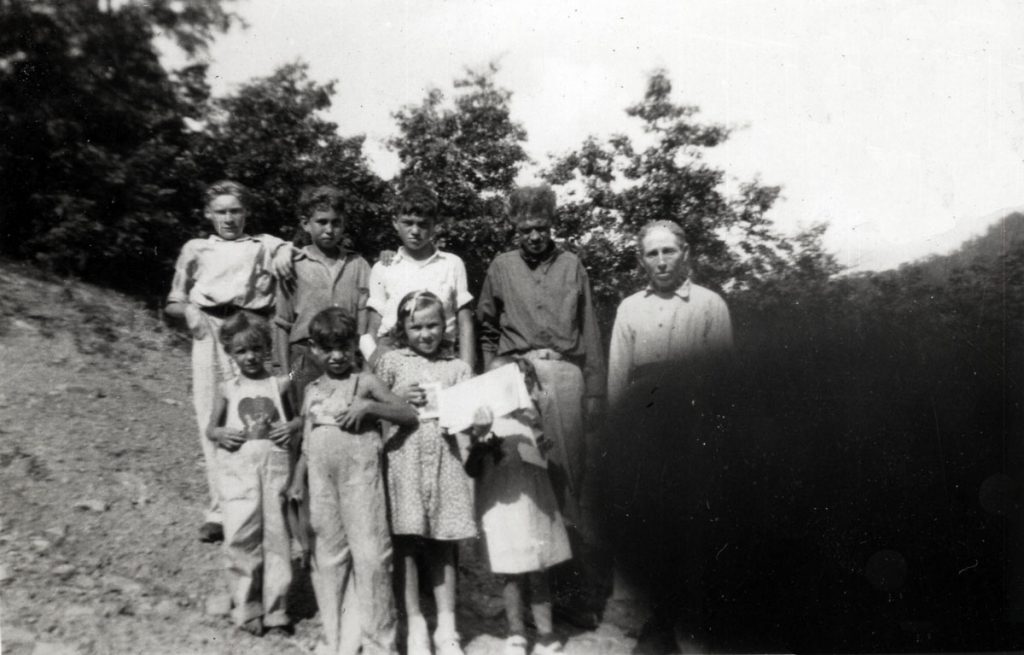
Divide Sunday School. 1937. Fred Elam Q. Bailey, Mrs. Hensley.” [same as 016] 045_VI_FN_pg2a_019
Henry Hensely — has now joined the CCs. He used to take care of the school house and it is since he left that most of the robberies have taken place.
John Hensely — about twenty-five. Big, dark.
Estel Elam, a grandchild. Intelligent, shrewd, very winning child, probably conscious of his physical condition, but seems very independent. Plays guitar and loafs at the store. He is entirely honest, as far as I know, but I am sure that he must know the persons responsible for the robberies. Of course, they all do — the boys — for that matter.
There is also a daughter, or the wife of one of the sons, who comes two or three times a year. She is a nice girl, quiet, pleasant, and I have always wanted to know her better.
The Turners
Walter — now married and does not come except for celebrations and then is to be watched.
Floyd — comes by spells and when he has a spell he takes it very seriously, becoming quite Moddyistic in his enthusiasm. Gives testimonials, escorts the teacher home to Pine Mountain, etc. Has not had an attack for a good while.
Minnie — comes occasionally, and always comes if she knows there will be refreshments.
Mary Turner O’Toole, and baby Gladys. Comes when home from Louisville where she rides in an automobile, and irons with an electric iron, and is quite a lady, so she says. Was formerly married to Kermit Creech, son of Bill Creech at the Divide. They were separated and divorced about five years ago and her present husband was in the CC, now has a job in Louisville.
cobb_handing_over_divide_005
Mary El Boggs — about five
Margie Boggs — about two
Martha Day — about twelve
Sally Day — about eighteen
Mrs. Alec Day — the Mother
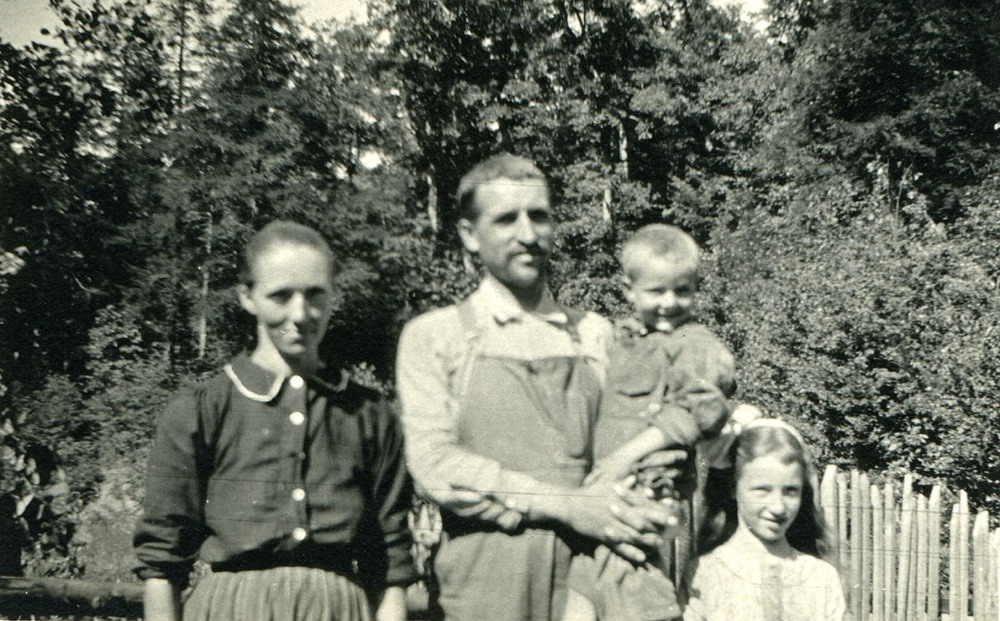
Frances Lavender Album. My friend Alec Day and family. There are 2 younger children. [lave041.jpg]
Fred Couch — about twelve or thirteen
Hannah Couch — occasional comer
Frank Couch — I don’t know, really, whether he is a Couch or a Turner but I believe he is brother or cousin to the above boys.
John Couch — CC boy, brother to Columbus and Fred, but not the same calibre.
Walter Creech
Jeanette Creech
Goldie Creech
Olga Wilder — comes now and then
Tommy Wilder — a bright little boy, but hard to handle in a crowd.
Anna Wilder –about nine years old …
John Bailey
Florris Bailey All belong to America’s family. They live back on Gabes Branch.
Elihu Bailey
America Bailey —about ten, black curly hair. Perfectly unapproachable. Smiles pleasantly, but you know you cannot believe her or get beneath to herself.
cobb_handing_over_divide_006
Mrs. Carrie Griffith — lives right close to the schoolhouse, and used to come regularly, but has not been regular for a long while.
Nannie Coots — lives in the little new house with a pailing fence on the way to the Divide. Sister to John Coots.
Sarah Jane Huff — Two quiet little girls who come occasionally. I know very little about them.
Goldie Huff
Mr. Bentley Huff
Chad Hall — second cousin to our Arnie [Hall]
Mrs. Jeff Nance — daughter of Black Sol Day, and sister to Alice and Shirley.
Hansel Nance — about five
Shelby Nance — baby
Has a little girl who comes, but I have forgotten her name. They just began coming two or three weeks ago.
Mrs. Willard Williams —
Biss Williams — about five and very spoiled. I growing to be dangerous. Throws rocks at people, and his mother is afraid to bring him to Sunday School, because he is so “rude.”
Baby — George Washington or Franklin D. [Roosevelt] – something celebrated but I have forgotten.
Lois Nolan
Fay Nolan — Children of Otto Nolan at the store. They can and should be there every Sunday. Lovely little girls, especially Lois.
That’s all I can remember off hand. There must be a dozen more. But they will all be there from time to time.
Back to ALICE COBB GUIDE TO WRITINGS, STORIES & LETTER COPIES
See Also ALICE COBB Biography

